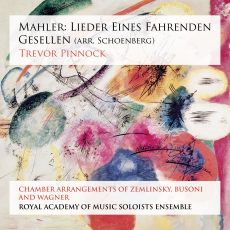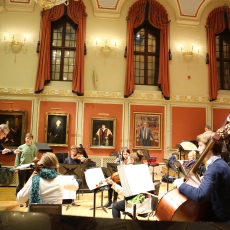Royal Academy of Music Soloists Ensemble & Trevor Pinnock - Mahler: Lieder eines fahrenden Gesellen - Gramophone
The first two instalments of Trevor Pinnock's series with the RAM Soloists Ensemble featured whole Austro-German symphonies arranged in chamber form. This third disc offers arrangements of something different. Mahler's Lieder eines fahrenden Gesellen and Zernlinsky's Maeterlinck-Lieder both, of course, started out in piano versions before being orchestrated by their composers. Even Busoni's haunting Berceuse élégiaque began life as a piano piece, before he expanded it into the orchestral version, premiered, incidentally, by Mahler and the New York Philharmonic in early 1911.
Here the Busoni is performed in the arrangement for chamber forces by Erwin Stein; the Mahler comes in Schoenberg's arrangements; the Zemlinsky in new versions by Christopher Austin. The Wagner, in a departure for the series, is in its original form. All four works together make for a well-balanced programme and the playing of the Royal Academy of Music chamber soloists is pleasingly flexible throughout, Linn's excellent engineering airy but detailed. The two singers involved, however, deserve better billing than they get on the packaging - one only finds out who they are by delving deep into the booklet to find their biographies. Both are RAM graduates at the start of promising careers. Gareth Brynmor John is a sensitive guide through the Mahler, even if his voice - light in timbre - as yet lacks colouristic variety or the interpretative sophistication that Bernarda Fink brought to her performances of this same version. Katie Bray's mezzo is richly spiced and colourful in potent performances of the Zemlinsky, and Austin's new arrangements manage to capture the best of both worlds, encompassing the quasi-symphonic and the beautifully intimate.
Pinnock and his players offer relatively swift accounts of the purely instrumental works but they never feel rushed. This performance of the Busoni comes in more than two minutes under that by Diabolicus but is no less atmospheric, with Michael Foyle's sinuous, snaking violin solos worth special mention. The Wagner, meanwhile, is beautifully mellow, bringing the disc to a lovingly shaped, gentle conclusion.


